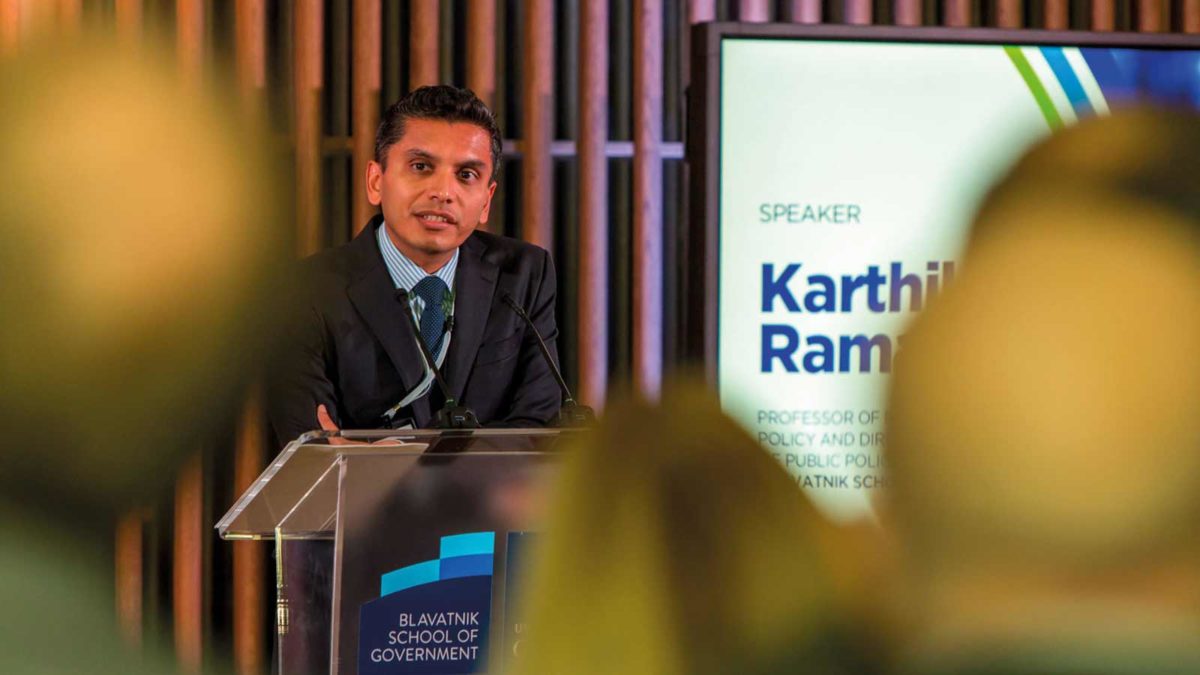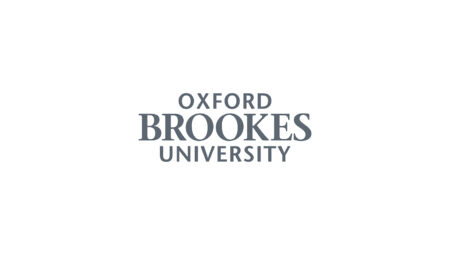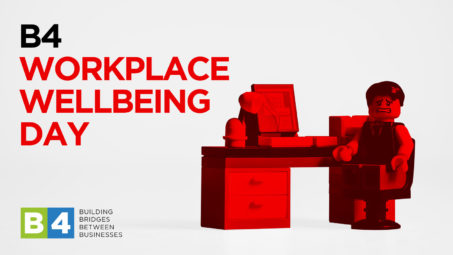
A Vision for Trust and Civility
As Professor of Business and Public Policy and Director of the Master of Public Policy Programme at the University of Oxford’s Blavatnik School of Government, Karthik Ramanna talks to B4’s Richard Rosser about how the school is empowering its students to help restore trust and civility throughout the world.
About Blavatnik School of Government
‘The Blavatnik School of Government was established to provide a convening space that would bring together those who are committed to a career in public service, to help them develop ways in which we might improve the performance of governments across the world. One of the things that makes this such an important and interesting venture – something that drew me here to Oxford – is that we are doing it in this moment in history, where trust between governments and the people they serve is at historic lows.
‘If, for instance, we were building this school in the roaring 1990’s, when the Soviet Union had collapsed and there was a general sense that the West had it ‘all figured out’, then this would have been a significantly less interesting venture. But, the fact that we are doing it today, when the whole post World War 2 consensus on what is the purpose of good government is coming undone, makes this such an urgent undertaking.’
Is Trust Hard to Gain and Retain in Today’s World?
‘By some measures, leaders in government, business CEO’s, and even some university professors are trusted less today than building contractors or hairdressers. How did we get here? Part of the issue is that real wages for individuals in the lower half of the skills distribution across western societies, whether it’s Great Britain or the USA, have more or less stagnated for four decades. So, if you happen to be in the top half of the skills distribution in society, over the course of the last forty years you will have seen quite considerable improvements in your real wages. But, if you happen to be born in the lower half of the skills distribution, things haven’t looked so good.
‘This is partly due to globalisation and increased competition, particularly for lower skilled jobs, from freer trade with countries like China and India. It has also been brought on by low skilled immigration into rich western societies that has put pressure on jobs in the lower part of the skills distribution. In addition, advances in technology and improvements in automation have made those low skilled jobs increasingly uncompetitive in the context of a market economy.
‘As these political and technological changes emerged over the course of the last four decades, those who were in a position to develop public policies to smooth over those transitions, to create new opportunities for people who would otherwise be left behind – I mean leaders in business and government and university professors – didn’t do what they were supposed to do. They didn’t necessarily choose not to do it for malicious reasons. Sometimes it was simply a case that nobody was paying close attention as the system changed, nobody was ‘at the wheel’ and so, in effect, we allowed a new system to develop that substantially and consistently undermined the capacity of approximately one half of the population to be competitive. That has resulted in tremendous political pressure against the system and against the elite who run the system. That’s how we have ended up in the place we are today.’
So what do we do about it?
‘One of the responses we are seeing in the political process today is rising populism, both on the left and on the right – individuals clamouring for greater restrictions to trade or greater restrictions on immigration or restrictions on the nature and pace of automation. To an extent, some of these populist sentiments and policies might represent part of the eventual portfolio of solutions that develops to manage our growth. But, populism often results in the introduction of policies that, in the long run, detract from the principles of a good and prosperous society.
‘So, how do we balance that pressure and anxiety that people are experiencing, particularly those who are in the lower half of the skill distribution, with the need to consistently generate the kind of innovation that’s necessary to be competitive in a global economy? This requires trust. It requires those in a position to design the rules of the game – whether they are leaders in business, government, or academia – to be able to make decisions that have long term implications, but that might involve some short term costs.
‘Those making such decisions need to earn the trust of those they serve and convince them that these decisions are in in the interests of society rather than the interests of the decision makers. Once we have recaptured the capacity of people to believe that those that are leading them are actually making decisions in their interests, then we will be able to make some progress.
Can we do that? This is why we have created this school – to convene people who are committed to a career in public service, to build skills such as active listening: that capacity to perhaps stop for a moment and appreciate what are the real problems that we ought to solve. We also seek to develop skills like negotiation and coalition building, because the school involves people with very different world views coming together and actually forging pragmatic solutions to pressing problems. It’s going to require analytical rigour and competence to make sound decisions in the long run. And it’s going to require integrity, because there is going to be enormous political pressure from those who will be seeking short term solutions and short term value.
Are you making progress?
‘I’m optimistic. It’s deeply encouraging for a school that is so young to be in a position where it is able to serve such a wide range of constituents across all levels of government and across different societies. That’s very encouraging progress. But there is still much work to be done.
‘One of the reasons why I am so keen to have had this meeting with B4 is that we have work to do in this community as well. We are a constituent member of the county of Oxfordshire and the city of Oxford, and we would very much like to be part of the process of problem solving in this city and in this community.’
Is Oxford unique or are there lots of similarities with the other cities around the world?
‘Oxford is very fortunate because the kinds of problems it has to deal with arise from managing economic growth so that it has benefits that are widely felt across society and so that growth is sustainable in an environmental sense. Many other cities and communities across the world have a different problem, which is a problem associated with an insufficient number of economic opportunities and increasing depopulation.’
Has Oxford outgrown itself?
‘From the perspective of the country as a whole, we can’t say we’ve had enough economic growth. The question is how can we channel the economic opportunities that emerge in a city like Oxford to other parts of the country where these opportunities would be very much welcomed. How do we create the infrastructure – for instance, rapid mass transport or relocation incentives – for some of the opportunities that would otherwise remain in Oxford to migrate to parts of the country that are underserved by economic growth? It’s a question of equilibrating the opportunities across the country and across the world, because there are some parts of the world that are doing quite well economically and there are others that would very much welcome those economic opportunities.
The Blavatnik School of Government’s MPP (Master in Public Policy)
‘The MPP is our flagship programme here at the Blavatnik School, and I think there are three things that make this programme distinctive. The first is that the 120 individuals that are part of the MPP each year represent approximately 60 different countries, so this is a programme that is tremendously diverse geographically. The students have very different experiences and they come with very different cultural perspectives. That creates an incredible opportunity for teaching and learning.
‘The second point is that we made a very deliberate decision not to segment the programme by experience. This means that we have individuals that are at the early part of their careers, perhaps in their early 20’s, and we have individuals that are ‘deeply seasoned’…they might be ministers in their home countries, senior civil servants, or leaders from the private or not-for-profit sectors. We think there is great value in this inter-generational learning, not just for people early in their careers to learn from those who are seasoned, but also vice-versa.
‘The third point of distinction is that, although we are part of a nine-hundred-year-old institution, we are one of the newest parts of the University, so we like to think that we have an entrepreneurial or ‘start up’ mind set. One of the things we do is put the students in the driving seat and allow them to play a huge part in determining what their teaching and learning experience looks like. The kinds of individuals that self-select and thrive in an environment like the Oxford MPP are those who are committed to rolling up their sleeves and solving problems – that entrepreneurial mind set, the sort that your members would very much empathise with and appreciate.’
Aspirations for the school, Oxford and Oxfordshire and the wider world?
‘The number one thing that I would hope that we as a school and, of course, the world as a whole is able to achieve in five years is restoring a sense of civility to public life. We talked about the erosion of trust between elites and the governed over the course of the last four decades. The lack of civility in public discourse is certainly not going to help us solve that problem. So, although we might not come up with the grand solutions to issues like structural migration, income inequality or climate change within five years, what we must do is restore a sense of civility in public life, because with that, anything is possible.’
More in Education

Art and design students team up with top sustainable fashion designers...
Oxford Brookes University students gained real life fashion industry experience by creating and building a set for two top British designers as part of London Fashion Week 2024.

GCSE & A-Level English Literature & English Language with Cherwell College...
The Power of Studying English Literature and English Language in Oxford

Oxford Brookes Business School students partner with Oxfordshire FA to conduct...
Students at Oxford Brookes University have partnered with the Oxfordshire Football Association to conduct research into inclusivity, diversity and access to grassroots sport for young people.
From this author

Business Services & Tech Day
It’s Business Services & Tech Day at B4. So we’re highlighting some recent and not so recent articles and press releases posted by B4 members over the past year or so.

Workplace Wellbeing Day
It’s Workplace Wellbeing Day at B4. So we’re highlighting some recent and not so recent articles and press releases posted by B4 members over the past year or so.

The Future of Christmas Parties
We are in National Lockdown #2 – What does that mean for the annual office Christmas party? Are Christmas parties cancelled this year?

